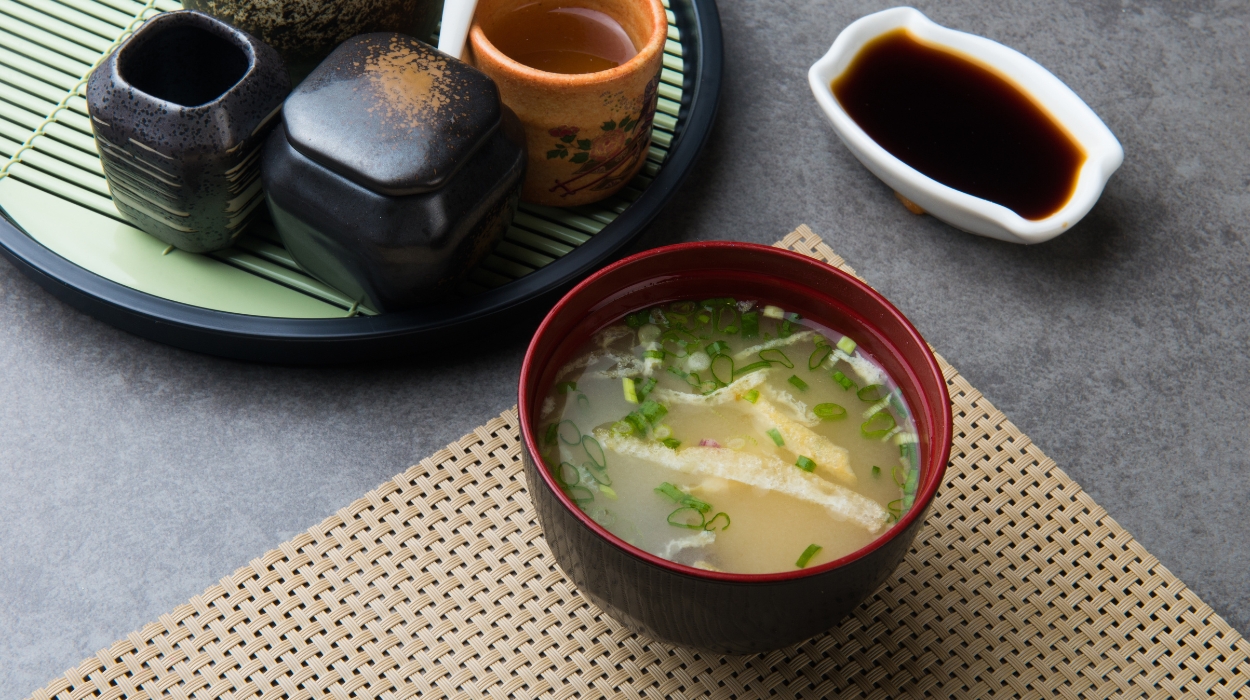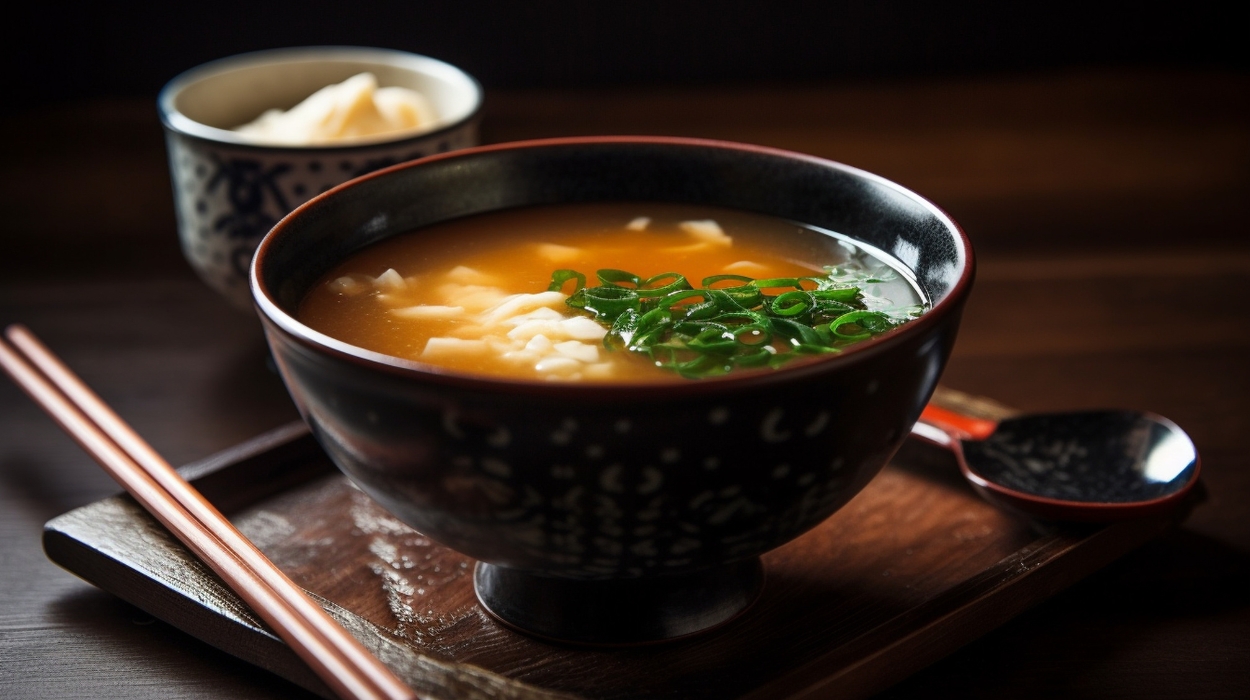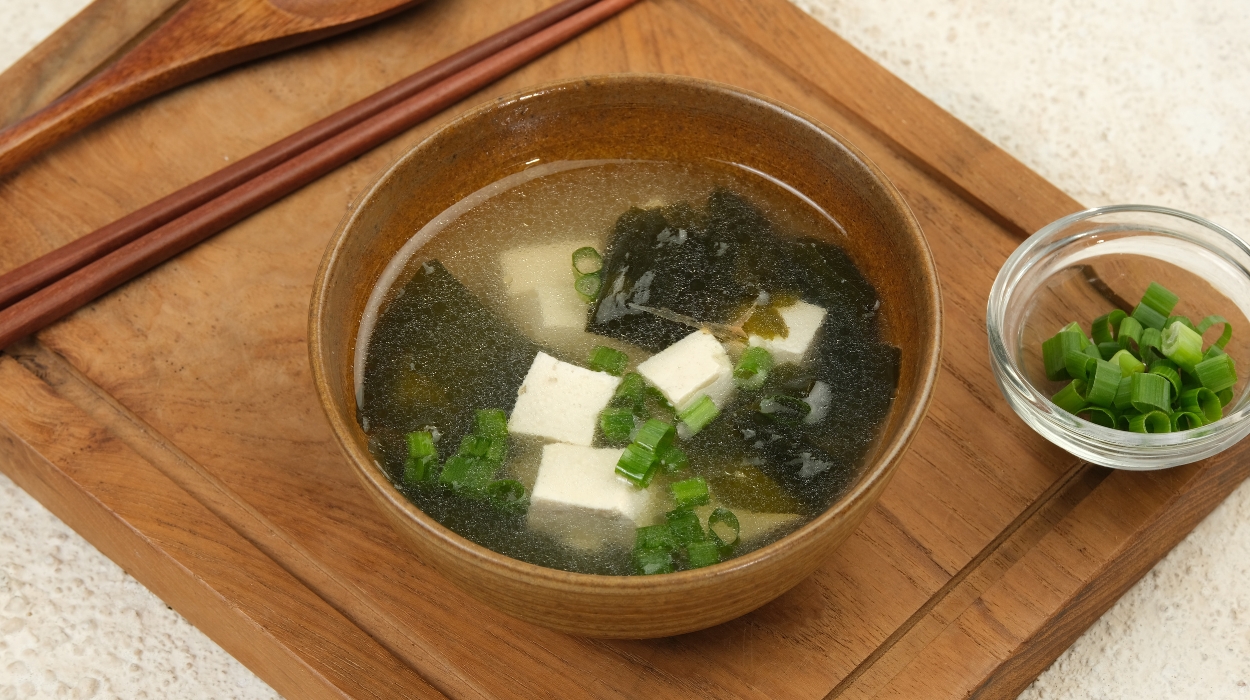Originally from Japan, miso soup has become popular worldwide. It is a low-calorie soup made from fermented soybeans, which offer several health benefits. Miso soup has been linked to weight loss, but is this true?
This article explores the question: is miso soup good for weight loss? We’ll also take a look at nutrition facts and how exactly miso soup can support weight loss. We’ll also look at other health benefits it offers, as well as how you can incorporate miso soup into your diet with other healthy foods. There are ways to easily add this fermented soybean paste to your diet, from diverse soup recipes to salad dressings.
Curious about adding miso soup to your diet to lose weight? You’ve come to the right place! Let’s get started.
Is Miso Good To Lose Weight?
Miso soup is a flavorful and potentially beneficial addition to a weight loss diet. Its low-calorie nature, wealth of nutrients, and potential appetite-regulating properties suggest it may support weight loss. Miso can be incorporated easily into diets due to its widespread availability, including simple soups and dressings. Considering its sodium content, it’s important to be mindful of consumption. Overall, food choices and an active lifestyle remain the best ways for effective and sustainable weight loss.
Is Miso Soup Good For Weight Loss?

The traditional Japanese broth offers taste while potentially delivering numerous health benefits, including weight loss. So, how is miso good for weight loss?
Miso Soup’s Nutritional Value
The nutritional value of miso soup makes it an excellent option for any weight loss journey. Let’s take a look at its nutritional breakdown.
One tablespoon of miso paste provides just 34 calories,[1] offering a low-calorie option if you’re trying to reduce your calories. It is also naturally low in fat and carbohydrates, with just 1 gram and 4 grams per serving.
Miso soup is also incredibly rich in vitamins and minerals. Per serving, it provides over a third[2] of your daily recommended vitamin K intake, which is essential for blood clotting and bone health.
Miso paste boasts an impressive profile of essential minerals, adding to its nutritional richness. Per tablespoon,[1] it contains 10 grams of calcium, 8 grams of magnesium, 27 grams of phosphorus, and 36 grams of potassium.
Calcium and phosphorus[3] are crucial for strong teeth and bones[4] while also supporting muscle function. Magnesium supports various functions[5] in the body, contributing to muscle health and nerve function. Potassium[6] is key for maintaining fluid balance, regulating blood pressure, and supporting muscle health.
One thing to be mindful of is the sodium content of miso paste. Per tablespoon, it contains 634 grams,[1] which is over 25%[7] of your daily recommended intake. Too much sodium can lead to increased blood pressure,[8] and a higher risk of heart,[9] and kidney disease.[10]
While relishing the nutritional benefits of miso soup, monitor your sodium intake to ensure a well-balanced diet.
What Makes Miso Soup Healthy For Losing Weight?
First and foremost, miso soup is remarkably low in calories while packing a nutritional punch. Eating low-calorie foods can contribute to a feeling of fullness without contributing significantly to your daily intake.
Miso soup is also naturally low in fat, making it a great option if you want to lose weight. Reducing your fat intake can support weight loss as this will reduce your overall calorie intake, as fats are calorie-dense.
The additions to miso soup, such as vegetables and cubed tofu, can further support weight loss. These ingredients will boost the soup’s fiber and protein content, both of which are great for weight loss. One study found that increasing your fiber intake, regardless of overall calorie intake, promotes weight loss.[11] Also, eating more protein has been shown to increase weight loss[12] and better support appetite.
The savory umami flavor of miso soup can promote a feeling of fullness[13] after consumption. This helps to curb any unnecessary cravings whilst offering a satisfying and tasty flavor.
Miso soup is also an excellent choice if you’re following a soup diet for weight loss. Miso paste is traditionally gluten-free, made primarily from fermented soybeans and rice. However, commercially produced pastes may contain added ingredients that contain gluten. If you’re following a gluten-free diet, be sure to check the label carefully before consuming.
While miso soup isn’t a direct weight loss solution by itself, it can be a valuable component of any weight loss journey. Achieving fat loss requires a balanced diet, reducing certain foods, and an active lifestyle.
If you’re struggling to lose weight, certain supplements and fat burners available in the market may be able to help. It’s crucial to consult a healthcare professional before incorporating these, as they can interfere with certain medications.
What Is Miso Soup?

Miso soup traces its origins back to ancient Japan, where it emerged as a nutritious dish cherished for its simplicity and depth of flavor.
Making miso involves fermenting soybeans, sometimes in combination with other grains like rice, and allowing them to mature. Different types of miso pastes offer different flavors and textures due to their unique ingredients and fermentation processes:
- White miso typically blends soybeans and rice to create a mild flavor.
- Yellow miso crafted from soybeans and barley, undergoes extended fermentation compared to white miso.
- Barley miso is similar to yellow miso, using soybeans and barley. It undergoes an even longer fermentation period, intensifying its flavor.
- Red, brown, or dark miso uses soybeans and is fermented for a long time. This produces a distinct and deeply flavored paste.
Preparing miso soup involves blending this paste with a broth, traditionally made from dried fish flakes and kelp. Once this is made, other ingredients, such as tofu, mushrooms, and green onions, are added for added depth and flavor.
Miso’s Health Benefits
Beyond its potential for supporting weight loss, miso soup offers other benefits for long-term health.
Incorporating miso soup into your diet may potentially reduce the risk of stomach[14] and breast cancer.[15] Some research also shows that eating miso soup may be beneficial for your cardiovascular system[16] by lowering your heart rate and blood pressure.
As a fermented food, miso naturally contains probiotics, which are great for overall gut health. Increased probiotic consumption has been linked to better weight loss outcomes.[17] Better gut health has also been associated with increased weight loss.[18]
How Can You Include Miso Soup In Your Diet?
Miso soup is readily available in various forms, from ready-to-eat options to instant packets or jars of miso paste found in grocery stores. While instant miso soup packets offer convenience, they often contain high sodium levels. Instant soup often contains monosodium glutamate, previously linked to health concerns that have since been debunked.[19]
Choosing homemade miso soup grants control over ingredients and customization to suit your preferences. Homemade instant miso soup embodies the authentic flavors and nutritional benefits without additives or excessive salt. Here’s how you can make miso soup at home:
- Ingredients: Choose your preferred miso paste, vegetable stock, and optional ingredients like tofu, seaweed, or mushrooms.
- Prepare the broth: Dissolve the miso paste in the vegetable stock, adjusting the ratio to achieve your desired flavor.
- Add your ingredients: Add your optional ingredients into the simmering broth, allowing them to cook until tender.
- Finishing touches: To preserve their flavor, turn the heat off before adding garnishes, such as green onions.
Incorporating miso into your diet can be great for both weight management and overall well-being. However, if you’ve never used it, you may wonder where to start. Here are a few recipes that you can use to integrate miso into your diet:
Miso-Sesame Salad Dressing
Ingredients:
- Miso paste
- Sesame oil
- Rice vinegar
- Honey or maple syrup (optional for added sweetness).
Instructions:
- Whisk together the miso paste, sesame oil, rice vinegar, and sweetener (if desired) to create a savory dressing for your salads. Adjust the ingredient ratios to suit your personal taste and dietary preferences.
Miso-Glazed Chicken With Roasted Vegetables
Ingredients:
- Skinless chicken breast
- Assorted vegetables (such as bell peppers, zucchini, and broccoli)
- Miso paste
- Olive oil
Instructions:
- Whisk the miso paste with a dash of olive oil, then brush onto the chicken breast.
- Roast the chicken and mixed vegetables in the oven until cooked through and slightly caramelized. Drizzle any remaining miso sauce over the veggies before serving.
Miso-Tahini Veggie Stir-Fry
Ingredients:
- Mixed vegetables (like snap peas, carrots, and bell peppers)
- Miso paste
- Tahini
- Soy sauce
Instructions:
- Stir-fry the vegetables in a pan until tender and crisp.
- Create the sauce by mixing the miso paste, tahini, and soy sauce. Drizzle over the stir-fried veggies.
Conclusion
Miso soup is a low-calorie, nutrient-rich option that may complement your weight loss goals. Its potential to promote satiety and boost flavors in various dishes makes it a great option for weight loss diets. From glazes to dressings, miso is a versatile ingredient that can seamlessly be added to your favorite meals.
It’s important to remember that achieving weight loss goes beyond eating a single food. While miso soup has some promising benefits, maintaining a balanced approach to weight loss is crucial. Sustainable weight loss is achieved through a balanced and nutritious diet and an active lifestyle.
Frequently Asked Questions
Drinking miso soup daily can offer nutritional benefits, but moderation is key. Its rich profile of nutrients and probiotics supports health, but excessive sodium consumption should be considered for overall wellness.
Instant miso soup can be nutritious, but some contain high sodium content. Seek varieties with lower sodium levels for a healthier option. Try and prioritize homemade or low-sodium options for the best nutritional value.
Determining the healthiest miso depends on personal preference and health needs. Choose low-sodium varieties for the best health benefits.
 Evidence Based
Evidence Based